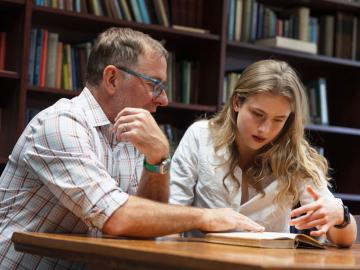Emily Stanford ’17 Receives Watson Fellowship
April 18, 2018
Amanda Nagy

Emily Stanford ’17 will spend a year traveling alone as a Watson Fellow to Australia, Papua New Guinea, Thailand, Madagascar, and Malawi to explore how different cultural perceptions of bats influence their conservation.
Stanford, who double majored in biology and environmental studies, says bats are the world’s most misunderstood mammals.
“Bats are unique, diverse, and fascinating. Bats are also very important for economies and ecosystems—they disperse seeds, pollinate plants, and consume crop-harming insects,” explains Stanford, a native of Tyler, Texas, who graduated in December 2017. “Despite these benefits, bat populations across the globe are declining due to human-caused activities such as deforestation, wind turbines, hunting, and active persecution. Bat conservation is further complicated by the fact that people are often wary of bats, associating them as signs of evil.”
Throughout her Watson year, Stanford wants to understand how people in different cultures view bats, asking, “Are they creepy or cute? Do they try to protect them or kill them? What are the main threats to bats, and can we find a way to peacefully exist with them?”
To explore these questions, Stanford will interact with various stakeholders involved with bat conservation. “I plan to volunteer at bat rehabilitation centers, assist local conservation organizations, shadow disease researchers, live among communities that hunt and eat bats for survival, stay with isolated groups that mine guano for a living, and much more.”
The Thomas J. Watson Fellowship is a one-year grant for purposeful, independent exploration outside the United States, awarded to graduating seniors nominated by one of 40 partner colleges. Fellows conceive original projects, deciding where to go, who to meet, and when to change course. They do not affiliate with academic institutions and may not hold formal employment. The fellowship provides a one-year stipend of $30,000.
Stanford says the Watson Fellowship provides a rare opportunity to deeply engage with and explore a topic in conservation work that she is passionate about, and she expects the project to push her to her limits.
“There will be many nights when I am lost, alone, stuck, confused, scared, and embarrassed; nights where I don’t have a bed to sleep on, if I sleep at all. There will be times when I am drenched in sweat and covered in mosquitoes—uncomfortable at best. But I am excited to embrace these challenges as I think it will make me stronger and help put my life in perspective.”
Stanford says the classes she took at Oberlin, such as Disease Ecology, helped her develop the ability to think critically and holistically about problems. She also credits the support and mentorship she received from faculty.
“At Oberlin, I felt comfortable speaking about my ideas in class, I felt at ease when I made mistakes, and I felt free enough to debate my professors about the nuances of a free-response question,” she says. “Having the opportunity to know my professors well paid off in many respects. I gained mentorship, friendship, and strong recommendation letters, which in turn helped me as I applied for summer programs. These smaller stepping stones built my experience and ultimately made the Watson Fellowship come within my reach.”
Stanford participated in the Oberlin debate team, was a varsity swimmer for one year, and served on a biology majors’ committee. She has also been a tour guide and interviewer in the admissions office. Following her Watson year, Stanford says she would like to give a TED talk about her travels, and she intends to pursue graduate programs with the goal of working in conservation and science education.
Tags:
You may also like…
Oberlin Named Top Producer of Fulbright Students for 2024-25
February 25, 2025
Nineteen Oberlin College and Conservatory students and alumni were awarded Fulbright grants for the 2024-25 academic year, making the college the No. 1 producer of honorees among U.S. undergraduate-only institutions.
Historian Jennifer L. Morgan ’86 Wins MacArthur Fellowship
October 1, 2024
Specialist in early American slavery has earned acclaim for extensive research and writing on the subject.
Ava Harvey ’26 Earns Leadership Alliance Summer Research Fellowship
August 8, 2024
Ava Harvey ’26 received a Summer Research Early Identification Program (SR-EIP) Fellowship from the Leadership Alliance.


